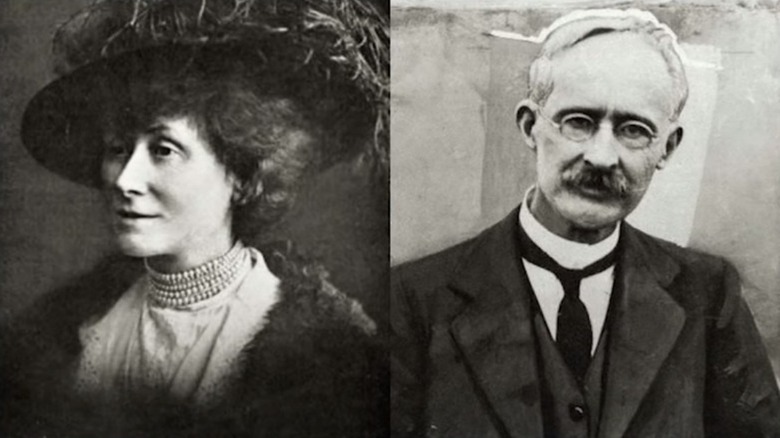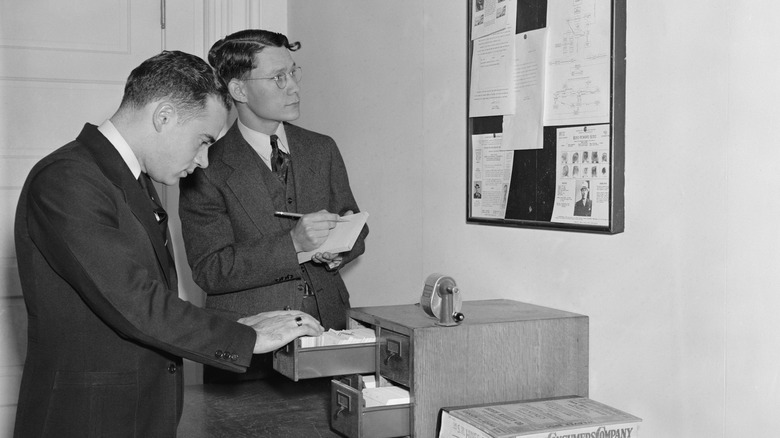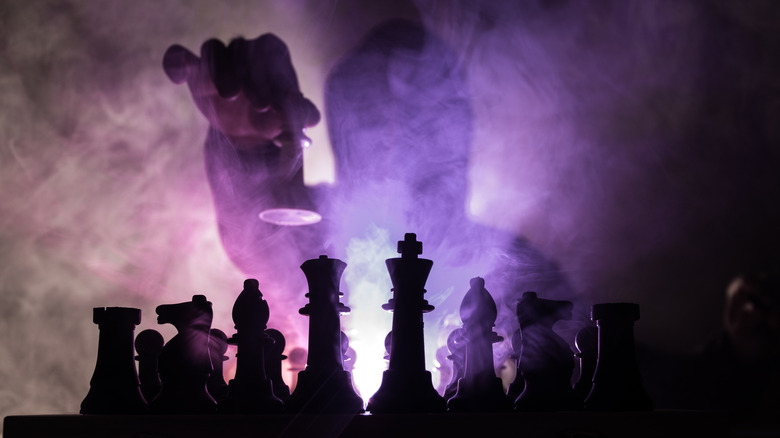The Unsolved Mystery Of Who Killed Julia Wallace
On the evening of January 19, 1931, a man who identified himself as R.M. Qualtrough called the Liverpool, England, Central Chess Club and asked to speak to William Herbert Wallace. As reported by Historic Mysteries, Wallace was an active member of the club who also worked as an insurance salesman. Although Wallace was not present at the time, the caller said he was interested in purchasing an insurance policy and wanted Wallace's home address. However, Samuel Beattie, who answered the call, said he was not comfortable giving the caller Wallace's address. As reported by the Julia Wallace Murder Foundation, the man decided to leave a message with his name and address and told Beattie to pass the information along to Wallace.
When Wallace arrived at the club, Beattie gave him the message. However, Wallace did not recognize the man's name or his address. Although he asked around the club, nobody else had ever heard of Qualtrough or the address. The following evening, Wallace went to the address provided by Qualtrough. It did not exist. Historic Mysteries reports Wallace asked some neighbors, shopkeepers, and a local police officer if they had any knowledge of Qualtrough or the address, but nobody had heard of the man or the address he had given.
When Wallace returned home later that evening, he found his wife Julie dead in the sitting room. According to Wallace, all of the doors were locked and the lights were off when he returned home.
William Wallace became the first suspect in his wife's murder
As reported by Historic Mysteries, it was clear that Julia Wallace (above) had been murdered, as she had been struck numerous times about the head with what appeared to be a blunt object. The Julia Wallace Murder Foundation reports authorities immediately identified William Wallace (above) as a suspect in his wife's murder, although they did not have enough evidence to make an arrest.
The Unredacted reports a forensics expert determined Julia died 45 minutes before William returned home. Authorities believed the killer would have likely been covered in blood, as "splatter had sprayed around the whole room." They also determined the killer did not clean himself or his clothing inside the home, as none of the sinks had been used after the murder was committed and no residue was found in the drains.
When authorities arrived on scene, William did not have any blood on himself or his clothing. He also stated that some money was missing from the home, suggesting burglary may have been a motive. Eventually they did find other evidence that led them to arrest William and charge him with his wife's murder.
As reported by The Unredacted, authorities confirmed that the unusual call to the chess club was made from a phone booth near the Wallace's home and next to the tram stop that would take William to the chess club. They also learned that William and Julie's relationship was troubled.
William Wallace was convicted and sentenced to death, but the conviction was overturned
Historic Mysteries reports that William Wallace was arrested and charged with murder on February 22, 1931, despite a lack of solid evidence. As reported by The Unredacted, the prosecution argued that William removed his clothing, bludgeoned his wife to death, then put his clean clothing back on. Although the defense argued that William had an alibi, and simply did not have time to commit the crime, a jury found William guilty of murder and sentenced him to death. As reported by The Unredacted, William's nervous and apparently emotionless demeanor as he took the stand likely swayed the jury to find him guilty, as the prosecution's lack of evidence was fairly obvious.
One month after his conviction, The Unredacted reports, Wallace's attorney filed an appeal with the Court of Criminal Appeal in London. Although it was highly unusual at the time, Justice Gordon Hewart overturned the verdict, stating the prosecution had not "proved with that certainty which is necessary in order to justify a verdict of guilty." William was therefore released and faced no further charges in Julia's death. He maintained his innocence until his death in February 1933.
Some people still believe William killed his wife, or hired someone else to do so. However, nobody else was ever arrested or charged in Julia's murder. There are several theories as to what may have happened to her, including some that do not involve her husband William.
Nobody else was ever arrested or charged in Julia's murder
As reported by Liverpool Echo, a serial burglar, nicknamed the Anfield Housebreaker, was active in the area at the time Julia Wallace was killed. Although William noted some money was missing from the home, and some of their belongings appeared to have been rifled through, authorities determined the details of the case were not similar to the Housebreaker's other crimes.
In 1984, author Roger Wilkes suggested William's former co-worker Richard Gordon Parry may have been responsible for Julia's death. As reported by Unsolved Casebook, Parry was questioned amid the investigation into Julia's murder. According to witness reports, Parry took his vehicle to a car wash on the evening Julia was killed. The witness claimed they found bloody gloves inside Parry's car.
It has been suggested that Parry may have killed Julia when she caught him stealing money, or the two may have been having an affair. However, he was ruled out as a suspect when his fiancée, Lily Loyd, provided him with an alibi. Unsolved Casebook reports Loyd later admitted she lied about being with Parry when Julia was killed, but authorities had already built a case against William.
Unsolved Casebook reports the Wallaces' neighbors, Jack and Florence Johnston, have also been accused of killing Julia. Author Tom Slemen said Jack confessed to the murder while on his deathbed. According to Slemen, the Johnstons planned to rob the Wallaces, and were unaware Julia was home.
Julia Wallace's murder remains unsolved
As reported by Unsolved Casebook, the Johnstons had a key to the home and would have been able to enter without breaking in, and the means to lock the door behind them. Jack and Florence Johnston moved out of town the day after Julia was killed. Jack and Florence's family has denied reports of the deathbed confession and said the move was planned prior to Julia's murder.
American crime novelist Raymond Chandler called the Wallace case the "nonpareil of all murder mysteries" and "the impossible murder," says Mental Floss. The English crime novelist P.D. James, however, was convinced that William was the only one who could have killed Julia Wallace. As reported in 2013 by The Guardian, James suggested the call to the chess club was likely made by Richard Parry as a prank. As authorities relied on their assumption that William made the call, and William's subsequent search for R.M. Qualtrough, simply blurred the facts of the case and contributed enough confusion to lead to William's ultimate acquittal.




